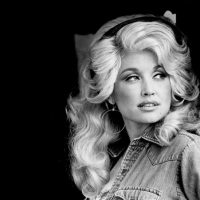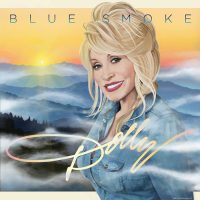
By Eleni P. Austin
Underneath the wigs and the boobs, Dolly Parton is truly a master-craftsman. In the nearly 50 years she has been a recording artist, Parton has been a pioneer and a trail-blazer.
Dolly Parton was born in Sevier County, Tennessee, the fourth of 12 children. Her father paid the doctor who helped deliver her with a bag of oatmeal. Times were hard, but Dolly was a talented child who showed an affinity for music at an early age. At nine years old, she was singing and performing on radio and television programs in Eastern Tennessee.
Dolly graduated in 1964 and moved to Nashville intent on a career in music. Her uncle, Bill Owens was already there carving out a nascent career as a songwriter. Dolly followed suit and artists like Skeeter Davis, Kitty Wells and Hank Williams, Jr. had hits with her compositions. She inked a publishing deal and was signed to Monument Records.
Monument had been responsible for Roy Orbison’s successful string of operatic Country hits. But they had no idea how to harness Dolly’s talent. Trading on the image she was just beginning to create, Monument had her sing a song she hadn’t written, “Dumb Blonde.” It received minimal attention.
Although she wanted to record Country music, the label thought her girlish vibrato was better suited to Pop songs. Aretha Franklin endured similar roadblocks at the beginning of her career. Signed to Columbia, they molded her in the image of a Jazz and Pop singer, (sort of a younger Dinah Washington). It was only after she moved to Atlantic Records that she began her reign as the Queen of Soul.
Dolly found an unlikely mentor in Country singer Porter Wagoner. Known as Mr. Grand Ole Opry, Wagoner began his recording career way back in the ‘50s. By the time he took notice of Dolly, he was starring in his own syndicated variety show. She replaced singer, Norma Jean, and suddenly she was on her way.
Wagoner had his label, RCA, sign her and their first duet, a cover of Tom Paxton’s “The Last Thing On My Mind” hit the Top 10. Her first solo single, for RCA, “Just Because I’m A Woman,” made it to #17. Finally in 1971, she had written and recorded her first #1 hit, “Joshua.” It was just the beginning.
Seminal tracks like “Jolene,” “Coat Of Many Colors” and “My Tennessee Mountain Home,” mined Dolly’s own experiences growing up “dirt poor” but happy, in a one room cabin at the foot of the Great Smoky Mountains.
By 1974, she ended her partnership with Wagoner. Her song “I Will Always Love You,” served as a heartfelt farewell. Dolly was ready to conquer the world. Three years later she was the first Country artist to achieve crossover success with the title track from Here You Come Again. It was #1 on the Country charts and #3 on the Pop Charts.
The streak continued as Dolly began acting in films. She made her acting debut with Jane Fonda and Lily Tomlin in “9 To 5” in 1980. An enormous hit, her title track was the first song to reach #1 simultaneously on the Country, Pop and Adult Contemporary charts. It also received an Academy Award nomination for “Best Song.”
Dolly spent the ‘80s straddling the Pop and Country charts. She acted in successful, (sometimes abysmal) movies, and she grew her brand by opening her own theme park, Dollywood.
Just when it seemed like Dolly had forsaken her Country comforts for Pop stardom, she recorded Trio, a collaboration with old pals Emmylou Harris and Linda Ronstadt. It was a traditional Country effort that featured their unique harmony blend. The album shot to #1 on the Country charts and produced four Top 10 singles.
Although she continued to write and record throughout the 90s, Country Music radio was moving away from established (i.e. OLD) artists and embracing newcomers like Garth Brooks and Alan Jackson. Instead of competing with the young crowd, Dolly recorded “Honky Tonk Angels” with Loretta Lynn and Tammy Wynette. She tackled an album of classic Rock covers and reconvened Harris and Ronstadt for Trio II.
At the turn of the 21st Century, Dolly really returned to her roots with a series of recordings that embraced the Bluegrass and Mountain music of her childhood. The Grass Is Blue, Little Sparrow, and Halos & Horns were released in 1999, 2001 and 2003.
Each album was a revelation, not only did Dolly include traditional songs and original compositions, but she recast Rock standards. Taking the crap-tastic “Shine” from Collective Soul and the epochal “Stairway To Heaven” from Led Zeppelin and giving them a back porch Bluegrass patina.
Dolly followed this creative renaissance with Those Were The Days, an album of ‘60s Folk covers, as well as the sly Backwoods Barbie and Better Day. She also wrote the song “Travellin’ Thru” for the transgender drama “Transamerica,” garnering a second Academy Award nomination. Finally, she wrote the music and lyrics for “9 To 5: The Musical,” which made it to Broadway.
Now Dolly has returned with her 43rd album, Blue Smoke. It gets off to a rollicking start with the title track. The clickity-clack rhythm, keening fiddle, sharp mandolin runs and intricate banjo riffs camouflage the feelings of heartache, as Dolly abandons an adulterous man… “Oh it hurts to know you cheated and it hurts to know you lied/But it hurts me even worse to know you never even tried.”
As a songwriter, Dolly remains at the top of her game. Three songs, “Unlikely Angel,” “Home” and “If I Had Wings” are a testament to her craftsmanship. “…Angel” is the flipside of the title track. An evocative encomium to the powers of redemptive love…”Like a Phoenix from the ash and dirt, I rose up from the pain and hurt/When I was at my very worst, I found you.” Anchored by fiddle,
mandolin, stand-up bass, dobro and acoustic guitar, this ethereal song is a showcase for Dolly’s crystalline harmonies.
“Home” is a little more boisterous, with a Country-politan arrangement and instrumentation. This song wouldn’t seem out of place on today’s Country radio, (except that the airwaves are cluttered with backwards baseball cap-wearin’ ‘bros.) A slightly autobiographical homage to Dolly’s rural point of origin…”where I can restore my soul, on the mountain slopes in the soft blue smoke.”
“If I Had Wings” also yearns for simpler times… “Oh I’ve had my share of sorrow, walked a long and lonesome road/I could use a new tomorrow, if I had wings I’d make it so.”
It has become something of a tradition for Dolly to take a popular song and transform it into something more bucolic. This time the results are mixed. She completely re-works Bob Dylan’s snotty kiss-off, “Don’t Think Twice, It’s Alright.” The arrangement is buoyant, jaunty and Bluegrass-tinged. Dolly’s sweetness shines through, taking the sting out of Dylan’s scabrous words.
She also tries her hand at Bon Jovi’s overwrought “Lay Your Hands On Me.” Her take is more spiritual, less sexual. But even Dolly’s magic can’t redeem this bombastic shite-storm.
“Blue Smoke” includes two duets, “You Can’t Make Old Friends” with Kenny Rogers and “From Here To The Moon And Back” with Willie Nelson. The former is a surprisingly poignant and graceful ode to Dolly and Kenny’s enduring friendship. Their effortless harmonies lock in as they wonder “How will I sing when you’re gone, ‘cause it won’t sound the same/Who will join me in those harmony parts when I call your name.”
The duet with Willie is a paean to enduring love. Dolly easily blends with Willie’s (always) idiosyncratic phrasing. As an added bonus he rips a gnarled solo on his trusty acoustic steed, Trigger. Longtime Willie sideman, Mickey Raphael weaves hypnotic harmonica fills through the melody.
Other interesting songs include “Miss You-Miss Me” a stately ballad that looks at divorce from a child’s perspective. “Banks Of The Ohio” is a stark Murder Ballad accented by spare instrumentation. The only mis-step here is “Lover du Jour” a frisky equation between French food and affairs of the heart. It comes off more coy than Amuse Bouche.
The album closes with the inspirational “Try.” Propelled by fiddle, mandolin, piano, Hammond B3 and lap steel, the song offers up a joyful distillation of her core philosophy….”Don’t live your life in shackles, when faith can be the key/The winner’s one that keeps determination in his eyes, who’s not afraid to fly and not afraid to try.” In anyone else’s hands it would feel impossibly mawkish, but with Dolly it just feels honest and sincere.
That’s where Dolly Parton’s power lies. Strip away the glitz and glam and there’s a genuine Mountain girl, yearning to entertain. Music trends come and go, but Dolly is forever.












































